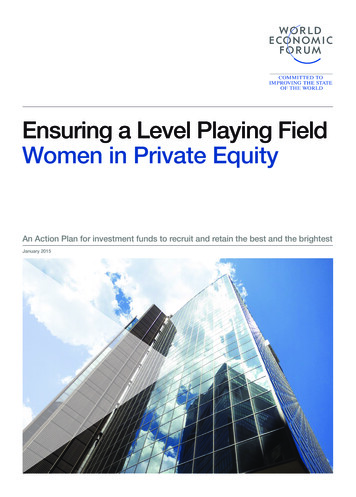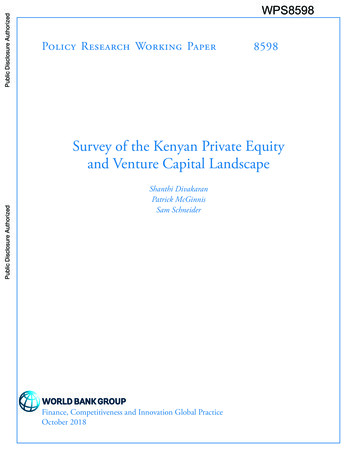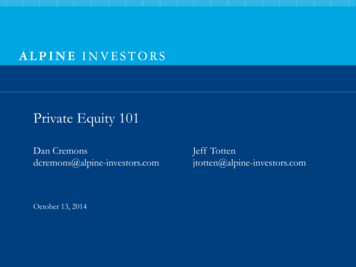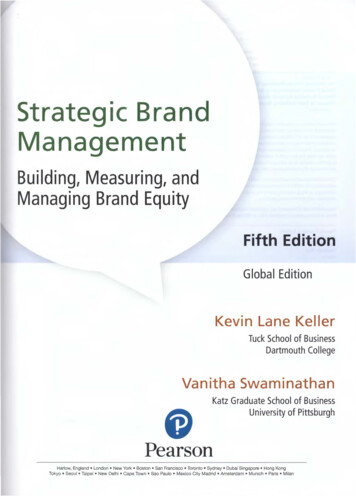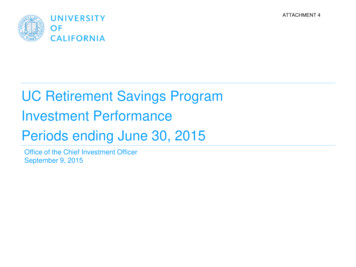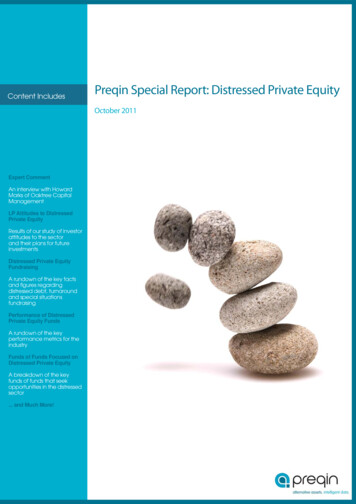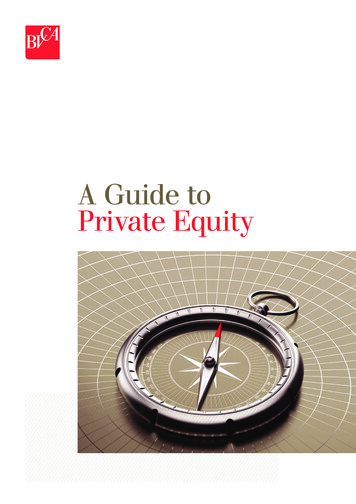
Transcription
xxxxxA Guide toPrivate EquityA Guide to Private Equity 1
xxxxx2 A Guide to Private Equity
BVCA mission statementTHE BVCA is the industry body and public policy advocate for privateequity and venture capital in the UK, an industry that accounts foralmost 60% of the European market. With a membership of over450 members, the BVCA represents an overwhelming majority ofUK-based private equity and venture capital firms and their advisers– from venture capital, through mid-market, to private equity/largebuy-out houses.For over 26 years, the BVCA’s voice has been one of authority whenspeaking for, or negotiating on behalf of, the UK industry to a widerange of key stakeholders: government, the European Commissionand Parliament, media and statutory bodies at home, acrossEurope and globally. We also promote our members’ services toentrepreneurs and investors, as well as providing valuable research,training and networking opportunities to our members.All members of the BVCA are listed in our annual ‘Directoryof Members’. Other publications include reports and analysisproduced by our Research team, such as the annual PerformanceMeasurement Survey and the Report on Investment Activity. Allpublications are available on the BVCA website: www.bvca.co.ukA Guide to Private Equity 1
Private Equity –investing in Britain’s future Each year UK private equity firms provide billions of pounds to form,develop and reshape over 1,600 ambitious UK companies with high growthprospects. Private equity makes managers into owners, giving them the freedom, focusand finance to enable them to revitalise their companies and take them ontotheir next phase of growth. Private equity is committed, long-term and risk sharing. It provides companieswith the personal experience of the investors and a stable financial base onwhich to make strategic decisions. UK private equity firms offer a wide range of sources, types and styles ofprivate equity to meet many different needs. A great variety of businesses in different industry sectors benefit fromprivate equity; including those operating in the high technology, industrial,healthcare, consumer services, financial and other sectors, and in differentdevelopment stages from start-up to large established companies.2 A Guide to Private Equity
PrefaceThe BVCA is the industry body and public policy advocate for the private equityand venture capital industry in the UK.With a membership of over 450 firms, the BVCA represents the vast majority ofall UK-based private equity and venture capital firms and their advisors.“A Guide to Private Equity” is a key component in the range of BVCApublications. For further details about other BVCA publications and researchsee the Appendix on page 50 or the BVCA’s website www.bvca.co.ukKeith Arundale, formerly with PricewaterhouseCoopers LLP and now auniversity lecturer and independent adviser, suggested that the BVCA shouldhave a guide to private equity which demystified the investment process - sohe was duly asked to write it!The first Guide was published in 1992 and since then many tens of thousandsof copies have been sent out or downloaded from the BVCA’s website. This newedition has again been updated by Keith, including the section on governmentsources of finance and new sections on specific considerations relating to venturecapital and management buyout deals, term sheets and the working relationshipbetween a private equity investor and management team. I would like to thankKeith for initiating the Guide and for his continuing help over the years.I would also like to thank the BVCA Executive for the production of anotherexcellent Guide.Simon HaversBVCA ChairmanFebruary 2010A Guide to Private Equity 3
ContentsBVCA mission statement1Private equity – investing in Britain’s future2Preface3An introduction to private equityDefinitionHow this Guide can help youWhat is private equity?Would my company be attractive to a private equity investor?Some of the benefits of private equityQuestions to ask yourself before reading furtherInternal and external financial resourcesGovernment sources of finance for SMEs and growing businesses in the UKBusiness angelsCorporate venturingInvestment forums and networking organisationsWell-know private equity backed companiesThe advantages of private equity over senior debtPrivate equity compared to senior debt666777788111111121213Sources of private equityPrivate equity firmsWhere do private equity firms obtain the money to invest in my business?How may the source of a private equity firm’s money affect me?How do I select the right private equity firm?1414141415Selecting a private equity firmTargetingStage / type of investmentIndustry sectorAmount of investmentGeographical location161616171718The business planEssential areas to cover in your business plan- The market- The product or service- The management team- Business operations- Financial projections- Amount and use of finance required and exit opportunitiesThe presentation of your business planThings to avoid191920212222232424254 A Guide to Private Equity
ContentsThe investment processReaching your audienceConfidentialityHow quickly should I receive a response?How do private equity firms evaluate a business plan?Presenting your business plan and negotiationsValuing the businessPersonal financial commitmentTypes of financing structureClasses of capital used by private equity firmsOther forms of finance provided in addition to equityAdditional points to be consideredSpecific considerations relating to venture capital and management buyout deals- How a venture capitalist arrives at his required equity stake- Use of preference shares in structuring a venture capital deal- Management buyoutsThe Offer Letter (Term Sheet)The due diligence processSyndicationCompletionAdditional private equity 838The role of professional advisersThe financial adviser’s roleThe accountant’s roleThe lawyer’s roleProfessional costs4040404142Your relationship with your investorPrivate equity for growth and successHands-on approachHands-off approachHelp to avoid the pitfallsTips for working with your private equity investorDirectors’ responsibilitiesGuidelines for success4343434444444545Realising the investmentThe optionsValuing the investment on exit464647Before you do anything – read this!Legal and regulatory issues you must comply with in raising financeThe Financial Services and Markets ActMisleading statements48484849Appendix – further informationContact detailsBVCA publications and researchOther useful contacts50505152A Guide to Private Equity 5
An introduction to private equityDefinitionPrivate equity is medium to long-term finance provided in return for an equity stake in potentially highgrowth unquoted companies. Some commentators use the term “private equity” to refer only to thebuy-out and buy-in investment sector. Some others, in Europe but not the USA, use the term “venturecapital” to cover all stages, i.e. synonymous with “private equity”. In the USA “venture capital” refersonly to investments in early stage and expanding companies. To avoid confusion, the term “privateequity” is used throughout this Guide to describe the industry as a whole, encompassing both “venturecapital” (the seed to expansion stages of investment) and management buy-outs and buy-ins.How this Guide can help youThis Guide aims to encourage you to approach a source of private equity early in your search for finance.It explains how the private equity process works and what you need to do to improve your chances ofraising it. It gives guidance on what should be included in your business plan, which is a vital tool in yoursearch for funding. It also demonstrates the positive advantages that private equity will bring to yourbusiness.The main sources of private equity in the UK are the private equity firms (who may invest at allstages – venture capital and buy-outs) and “business angels” (private individuals who providesmaller amounts of finance at an earlier stage than many private equity firms are able to invest).In this Guide we principally focus on private equity firms. The attributes that both private equityfirms and business angels look for in potential investee companies are often very similar and sothis Guide should help entrepreneurs and their advisers looking for private equity from both thesesources. “Corporate venturers” which are industrial or service companies that provide funds and/or a partnering relationship to fledgling companies and may operate in the same industry sector asyour business can also provide equity capital.Throughout the 1990s the technology hype, internet boom and massive capital investment propelled theNew Economy revolution, but internet mania in the late 1990s caused technology stocks to skyrocketuntil the bubble burst in the year 2000. There was over-optimism, too much easy money, proven waysof doing business were replaced by irrational exuberance and private and public company marketvaluations were driven to unsustainable levels. The mid 2000’s saw a substantial increase in the laterstages of private equity transactions with large and mega buyouts fuelled by significant amounts ofdebt. With the onset of the credit crunch in 2007/8 and the reduction in the general availability of bankloans, and tightening of the conditions required to obtain loan finance, there is considerably less debtavailable for deals in the current economic environment. Banks are reluctant to lend, particularly if theyhave not had the experience of going through a downturn in the leveraged, high risk market before.There is however currently no shortage of private equity funds for investment in the UK. Private equitydeals going forward are likely to involve much less leverage, and therefore perceived lower risk forthe banks. Excellent opportunities remain open to companies seeking private equity with convincingbusiness proposals.Private equity firms are looking for investment opportunities where the business has proven potentialfor realistic growth in an expanding market, backed up by a well researched and documented businessplan and an experienced management team – ideally including individuals who have started and runa successful business before. This Guide will help you to understand what private equity firms arelooking for in a potential business investment and how to approach them.6 A Guide to Private Equity
An introduction to private equityWhat is private equity?Private equity provides long-term, committed share capital, to help unquoted companies grow andsucceed. If you are looking to start up, expand, buy into a business, buy out a division of your parentcompany, turnaround or revitalise a company, private equity could help you to do this. Obtainingprivate equity is very different from raising debt or a loan from a lender, such as a bank. Lenders havea legal right to interest on a loan and repayment of the capital, irrespective of your success or failure.Private equity is invested in exchange for a stake in your company and, as shareholders, the investors’returns are dependent on the growth and profitability of your business.Private equity in the UK originated in the late 18th century, when entrepreneurs found wealthy individualsto back their projects on an ad hoc basis. This informal method of financing became an industry inthe late 1970s and early 1980s when a number of private equity firms were founded. Private equity isnow a recognised asset class. There are over 250 active UK private equity firms, which provide severalbillions of pounds each year to unquoted companies.Would my company be attractive to a private equity investor?Many small companies are “life-style” businesses whose main purpose is to provide a good standardof living and job satisfaction for their owners. These businesses are not generally suitable for privateequity investment, as they are unlikely to provide the potential financial returns to make them of interestto an external investor.“Entrepreneurial” businesses can be distinguished from others by their aspirations and potential forgrowth, rather than by their current size. Such businesses are aiming to grow rapidly to a significantsize. As a rule of thumb, unless a business can offer the prospect of significant turnover growthwithin five years, it is unlikely to be of interest to a private equity firm. Private equity investors areonly interested in companies with high growth prospects, which are managed by experienced andambitious teams who are capable of turning their business plan into reality. However, provided thereis real growth potential the private equity industry is interested in all stages, from start-up to buy-out.Some of the benefits of private equityPrivate equity backed companies have been shown to grow faster than other types of companies.This is made possible by the provision of a combination of capital and experienced personal input fromprivate equity executives, which sets it apart from other forms of finance. Private equity can help youachieve your ambitions for your company and provide a stable base for strategic decision making. Theprivate equity firms will seek to increase a company’s value to its owners, without taking day-to-daymanagement control. Although you may have a smaller “slice of cake”, within a few years your “slice”should be worth considerably more than the whole “cake” was to you before.Private equity firms often work in conjunction with other providers of finance and may be able to helpyou to put a total funding package together for your business.Questions to ask yourself before reading further Does your company have high growth prospects and are you and your team ambitious to growyour company rapidly? Does your company have a product or service with a competitive edge or unique selling point (USP)? Do you and/or your management team have relevant industry sector experience? Do you havea clear team leader and a team with complementary areas of expertise, such as management,marketing, finance, etc? Are you willing to sell some of your company’s shares to a private equity investor? If your answers are “yes”, private equity is worth considering.A Guide to Private Equity 7
An introduction to private equityInternal and external financial resourcesBefore looking at new external sources of finance, make sure you are making optimal use of yourinternal financial resources. Ensure that you have good cash flow forecasting systems in placeGive customers incentives to encourage prompt paymentAdhere to rigorous credit control proceduresPlan payments to suppliersMaximise sales revenuesCarefully control overheadsConsider sub-contracting to reduce initial capital requirements (if appropriate)Assess inventory levels (if appropriate)Check quality controlThen think about the external options. Your own and your co-directors’ fundsFriends’ or business associates’ fundsThe clearing banks – overdrafts, short or medium-term loansFactoring and invoice discountingLeasing, hire purchaseInvestment banks – medium to long-term larger loansPublic sector grants, loans, regional assistance and adviceBusiness angel financeCorporate venturingPrivate equityBut please don’t get the impression that private equity is a last resort after you have exhausted yourown, your friends’, your business colleagues’ and your bank’s resources. There are many advantagesto private equity over bank debt. Private equity firms can of course work in conjunction with the otherexternal sources as part of an overall financing package.Some of the alternative sources of external finance are elaborated on below for your information. Thesemay particularly apply if you are looking for finance at the lower end of the so-called ‘equity gap’, say upto 250,000 or 500,000. The ‘equity gap’ is widely regarded as being between 250,000 and 2 millionwhere it can be difficult to secure venture capital finance simply because of the amount of time and effortrequired to appraise an investment proposition by a venture capital firm. For smaller amounts of financeit is not simply worth their while, unless there will be further financing rounds required later. More recentlythe UK has addressed the range of financing towards the upper end of the equity gap with the EnterpriseCapital Funds (ECFs) – see below – that can provide up to 2 million of financing.Government sources of finance for SMEs and growing businesses in the UKThese include the following:Enterprise Finance Guarantee (EFG)The Enterprise Finance Guarantee (EFG) replaced the Small Firms Loan Guarantee Scheme (SFLG)and provides loans from 1,000 up to 1 million, repayable over 10 years, compared to an upper limitof 250,000 for the SFLG, and supports businesses with a turnover of up to 25 million, comparedto 5.6 million under SFLG. The EFG can be used to support new loans, refinance existing loans or toconvert part or all of an existing overdraft into a loan to release capacity to meet working capital needs.The Government will guarantee 75% of the loan. EFG is available to viable businesses that in normalcircumstances would be able to secure lending from banks but who cannot secure bank lending inthe current times. Most businesses in most sectors are eligible for the scheme. However, the state aidrules exclude businesses in the agriculture, coal and steel sectors.8 A Guide to Private Equity
An introduction to private equityRegional Venture Capital Funds (RVCFs)The Regional Venture Capital Funds (RVCFs) were set up to address small to medium enterprises(SMEs) seeking relatively small-scale investment of up to 500,000 (subsequently raised to 660,000).The RVCFs operate on a regional basis with the objective of testing whether returns can be earnedfrom having regionally focused investment teams targeting equity gap investment. The funds coverthe North East, North West, London, Yorkshire and the Humber, South East and South West, EastMidlands, West Midlands and East of England regions of the UK. The last RVCF ceased making newinvestments in December 2008 but the funds are still able to support existing portfolio businesses. TheEnterprise Capital Fund (ECF) programme has now superseded the RVCFs.Enterprise Capital Funds (ECFs)Enterprise Capital Funds (ECFs) are a UK government initiative aimed at bridging the equity gap byimproving access to growth capital for small and medium-sized enterprises by applying a modifiedUS Small Business Investment Company (SBIC) model to the UK, a difference being that with the UKscheme the government has downside protection with a priority return of 4.5% per annum plus aminor profit share.ECFs are privately managed and use a limited partnership model with two variants: a professional FSA authorised fund manager who acts on behalf of passive investors an active investor model (e.g. business angels) who invest and manage their own funds throughECFs (maybe without FSA authorisation).There are now eight ECFs in operation and a further fund was recently awarded ECF status. Responsibilityfor the management of ECFs was transferred to Capital for Enterprise Limited (CfEL) in 2008.ECFs receive their funding from the UK government and private sources. There is no maximum fundsize for an ECF, but the government will commit no more than 25 million to a single fund or no morethan twice the private capital, whichever is lower.Equity investments of up to 2 million per deal can be made but to avoid the problems of dilution experiencedby many early stage investors ECFs are allowed to invest more than 2 million in a single company if not todo so as part of a subsequent funding round would dilute their exiting stake in the company.To access support from an Enterprise Capital Fund contact your local Business Link or contact therelevant fund manager. The eight currently operational ECFs are: IQ Capital Fund21st Century Sustainable Technology Growth FundThe Seraphim Capital FundThe Amadeus Enterprise FundThe Catapult Growth FundDawn Capital ECFOxford Technology Management ECFMMC Venture Managers.CfEL also has responsibility for the Enterprise Finance Guarantee scheme (above) and includes anumber of funds in its portfolio, additional to the ECFs. These include: Capital for Enterprise Fund (CFE) (mezzanine debt and equity support for established growthbusinesses across the UK) Aspire Fund (targeting women led businesses across the UK) Bridges Social Entrepreneurs Fund and the Bridges Sustainable Property Fund (specific strategiesto achieve a positive social and/or environmental impact). Early Growth Funds (below).A Guide to Private Equity 9
An introduction to private equityEarly Growth FundsEarly growth funds are regional and national funds provided through the Small Business Service (SBS).They can provide up to 100,000 for innovative and knowledge-intensive start-up and early-stagebusinesses as well as other growth businesses. In most cases they must be matched by at least thesame amount of private sector investment.Grants for Business Investment (GBI)Grants for Business Investment (GBI) (formerly known as Selective Finance for Investment in Englandor SFIE grants) are discretionary grants available from Government through the Department forBusiness, Innovation & Skills (BIS) to support businesses with investment projects which will increaseproductivity, skills and employment in deprived areas in England. The GBI grants are managed bythe Regional Development Agencies. SFIE itself replaced the former Regional Selective AssistanceScheme. The scheme is designed for businesses that are looking at the possibility of investing inan area of high deprivation but need financial help to go ahead. It is awarded as a percentage ofeligible project expenditure and is provided as a grant towards capital costs such as fixed assets,land, property and machinery. Grants can be used for start-ups, modernising through introducingtechnological improvements, expanding an existing business, or taking a new product /service/process from the development stage to production. The amount of support you will be awarded willdepend on the specific needs of your project, the quality of the project and its impact on productivityand skills. The project must create new jobs or safeguard existing employment if seeking support of 100,000 or more.University Challenge Seed Fund SchemeThe aim of the Government’s University Challenge Seed Fund Scheme is to fill a funding gap in the UKin the provision of finance for bringing university research initiatives in science and engineering to thepoint where their commercial viability can be demonstrated. Certain charities and the government havecontributed around 60 million to the scheme. These funds are divided into 19 University ChallengeSeed Funds that have been donated to individual universities or consortia and each one of these hasto provide 25% of the total fund from its own resources. If you are looking into the commercialisationof research at a UK university which is in receipt of a fund, contact your university administrationto enquire about the application process. Follow-on finance may be provided by business angels,corporate venturers and private equity firms.Grants for Research & DevelpmentGrants for Research & Development (previously the DTI ‘Smart’ scheme) aim to help start-upsand SMEs carry out research and development work on technologically innovative products andprocesses. They are administered by the nine English Regional Development Agencies. There arefour different types of research and development project that a grant can be awarded for with grantsvarying from up to a maximum of 20,000 to up to a maximum of 500,000.UK Innovation Investment Fund (UKIIF)The Government is in the process of setting up a venture capital-based 150 million InnovationInvestment Fund as a vehicle to encourage growing small businesses, start-ups and spin-outs in hightech businesses. The new scheme will invest alongside private sector investment on a pari-passubasis; it is the Government’s belief that this could leverage enough private investment to build a fundof up to 1 billion over the next 10 years.Two fund of funds managers have recently been appointed to operate the scheme with responsibilityfor ensuring that investment is directed at companies with “strong survival and growth prospects”.Individual fund managers will be told to target the “sectors of the future” – businesses in the lifesciences, low-carbon, digital and advanced manufacturing businesses, in the search for worthwhileinvestments. It is hoped that the fund of funds approach will avoid competing with other public sectorinvestment initiatives such as the Enterprise Capital Funds.10 A Guide to Private Equity
An introduction to private equityEnterprise Investment SchemeThe Enterprise Investment Scheme which was set up by the UK government to replace the BusinessExpansion Scheme (BES) and to encourage business angels to invest in certain types of smallerunquoted UK companies. If a company meets the EIS criteria (See http://www.hmrc.gov.uk/eis/), itmay be more attractive to business angels, as tax incentives are available on their investments. Underthe Enterprise Investment Scheme, individuals not previously connected with a qualifying unlistedtrading company (including shares traded on the Alternative Investment Market (AIM)) can makeinvestments of up to 500,000 in a single tax year and receive tax relief at 20 % on new subscriptionsfor ordinary shares in the company, and relief from CGT on disposal, provided the investment is heldfor three years.Venture Capital Trusts (VCTs)Venture Capital Trusts (VCTs) which are quoted vehicles to encourage investment in smaller unlisted(unquoted and AIM quoted) UK companies. Investors receive 30% income tax relief on VCT investmenton a maximum investment amount of 200,000 in each tax year provided the investment is held forfive years. Shares in VCTs acquired within the annual limit are also exempt from capital gains tax ondisposal at any time.For further information on the above UK government grants and others available visit the websiteof the Business Links at www.businesslink.gov.uk. In addition to providing advice on the variousgrants available to SMEs and growth companies the Business Links provide advice, help and an entrypoint to the various schemes run by the Department for Business, Innovation and Skills (BIS). Newbusinesses (particularly those using new technology) can get help with premises and managementfrom the various Business Incubation Centres in the UK or from one of the UK Science Parks. Youmay also be eligible for EU grants if you are in an innovative business sector or are planning to operatein a deprived area of the UK or a region zoned for regeneration. Apart from Business Links your localChamber of Commerce and town hall should have lists of grants and available property.Business angelsBusiness angels are private investors who invest directly in private companies in return for an equitystake and perhaps a seat on the company’s board. Research has shown that business angels generallyinvest smaller amounts of private equity in earlier stage companies compared with private equityfirms. They typically invest between 20,000 and 200,000 at the seed, start-up and early stages ofcompany development, or they may invest more than this as members of syndicates, possibly up to 1.5 million. Business angels will usually want a “hands-on” role with the company that they invest in,maybe as an adviser and/or a non-executive director or they may even take on an executive role. Manycompanies find business angels through informal contacts, but for others, finding a business angelmay be more difficult, as the details of individual business angels are not always available. The BritishBusiness Angels Association (BBAA) lists its members on its website (www.bbaa.org.uk) so this is agood place to start to help you find business angel investor networks in the UK.Corporate venturingCorporate venturing has developed quite rapidly, albeit sporadically, in recent years but still representsonly a small fraction when compared to private equity investment activity. Direct corporate venturingoccurs where a corporation takes a direct minority stake in an unquoted company. Indirect corporateventuring is where a corporation invests in private equity funds managed by an independent privateequity firm. Corporate venturers raise their funds from their parent organisations and/or from externalsources.A Guide to Private Equity 11
An introduction to private equityInvestment forums and networking organisationsIn addition to business angel networks you can also find angel investors (and venture capitalists) atvarious investment forums that are organized in the UK. Typically at these events entrepreneurs seekingcapital get to present their propositions to an audience of VCs, angels, corporate investors and advisors.Presenters have around 10 to 15 minutes to make their presentation (a sort of extended ‘elevator pitch’).Depending on the prestige and size of the event there may be a selection process to decide whichcompanies get to make presentations and payment may or may not be required. Some of these eventsare put on by the larger conference organizers, others are organized by universities and business schoolsand networking clubs. Usually, in addition to the company presentations, there will be one or moreplenary sessions from invited guest speakers, including successful entrepreneurs on topical issues.Do speak to friends, business contacts and advisers as well as your local Business Link. Do rememberthere are many misconceptions about the various sources of finance, so obtain as much informationas possible to ensure that you can realistically assess the most suitable finance for your needs andyour company’s success.Well-known private equity backed compan
development stages from start-up to large established companies. A Guide to Private Equity 3 Preface The BVCA is the industry body and public policy advocate for the private equity and venture ca
